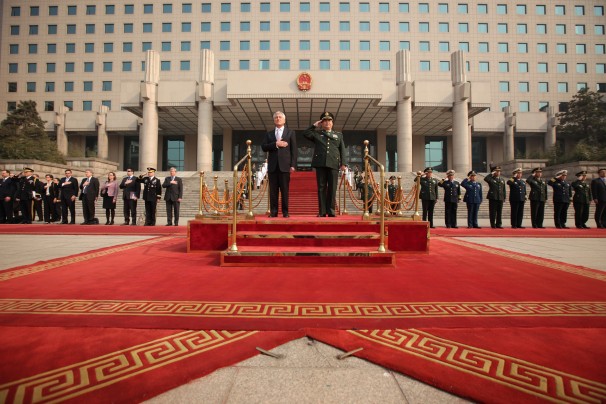(Photo Credit: Alex Wong/AP)
(BGF) – On April 8th, The Washington Post published an article by Ernesto Londoño that discussed U.S. Defense Secretary Chuck Hagel’s visit to China. Londoño notes that, despite rhetoric emphasizing cooperation between the U.S. and China, Secretary Hagel’s visit to China highlighted the differences between the two military superpowers. In particular, China worries that U.S. actions in the region are designed to contain China’s military rise, despite Secretary Hagel’s reassurances otherwise. An excerpt of the article is provided below. Click here to read the full article or visit The Washington Post‘s website.
By Ernesto Londoño
BEIJING – Near a banner offering him a “warm welcome,” Defense Secretary Chuck Hagel urged officers at China’s premier military university to work toward a new era of cooperation between the world’s top military rivals.
But during his first trip to China as Pentagon chief, icy body language and barbs telegraphed a relationship utterly devoid of warmth and very much saddled by suspicion.
Chinese Defense Minister Chang Wanquan offered a defiant defense of Beijing’s territorial claims over two sets of islands contested by Japan and the Philippines, disputes that are particularly vexing for Washington because it has defense treaties with both nations.
“On this issue, we will make no compromise, no concession — not even a tiny violation is allowed,” the Chinese minister warned sternly. “We are prepared at any time to cope with any type of threats and challenges.”
Chinese officials have long viewed the Obama administration’s policy to expand military and diplomatic engagements in Asia as an effort to contain Beijing’s military rise and bolster its rivals in the region. U.S. officials have made a concerted effort to dispel that narrative, saying they welcome a rising China, as long as it acts in a way they deem constructive. That effort has a long way to go.
After Hagel wrapped up his afternoon speech with tales of a friendly exchange over the radio between sailors aboard U.S. and Chinese ships that crossed paths in the East China Sea, the tone once again turned confrontational.
A researcher at the school demanded to know whether the United States was taking the side of Japan and the Philippines in the territorial disputes to create havoc for China and stymie its military rise.
“You are using the excuses of the islands to make trouble for China to hamper its [military] development,” said the officer. “That is what we worry about.”
While the bulk of Hagel’s remarks Thursday were conciliatory and forward-looking, he wagged his finger at one point, protestingChina’s surprise establishment last year of an air defense zone in an area that includes the islands that are the subject of Beijing’s dispute with Tokyo.
“Every nation has the right to establish air defense zones, but not a right to do it unilaterally, without consultation,” Hagel told reporters, speaking alongside his Chinese counterpart.
As China has invested mightily in defense in recent years, the United States has become keenly interested in and alarmed by its capabilities, particularly in cyberspace. U.S. officials have begun urging China to be more transparent about its expanding military complex.
Click here to continue reading.
